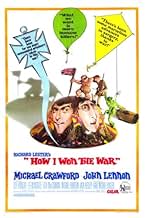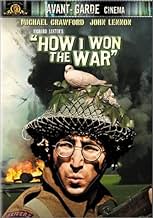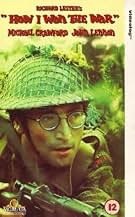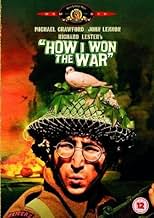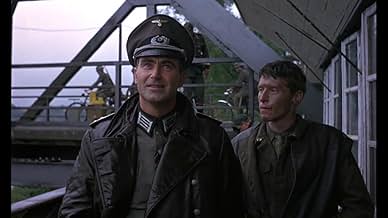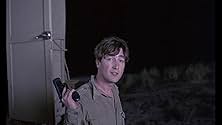NOTE IMDb
5,5/10
2,6 k
MA NOTE
Pendant la Seconde Guerre mondiale, un commandant britannique incompétent entraîne ses troupes dans une série de mésaventures en Afrique du Nord et en Europe.Pendant la Seconde Guerre mondiale, un commandant britannique incompétent entraîne ses troupes dans une série de mésaventures en Afrique du Nord et en Europe.Pendant la Seconde Guerre mondiale, un commandant britannique incompétent entraîne ses troupes dans une série de mésaventures en Afrique du Nord et en Europe.
- Réalisation
- Scénario
- Casting principal
Avis à la une
Although (unfairly) ravaged by critics at the time and so generally dismissed ever since, HOW I WON THE WAR is both a brilliant anti-war film and anti war film film (much more so than the usually heralded M*A*S*H). Filled with biting satire and brilliant performances from Michael Crawford, John Lennon, Roy Kinnear, Ronald Lacey, Michael Hordern and, well, the entire cast, HIWTW was perhaps a bit too odd for 1967 audiences who expected perhaps a more madcap adventure, but today it deserves not only a rethink - but a reissue on DVD. (Why this wonderful movie is not available on DVD (at least in the US) is yet another slap in its face.) Richard Lester and writer Charles Wood (who also wrote HELP! for the Beatles) have crafted a brilliant black comedy that easily stands with Dr Strangelove. It won't be everyone's cup of tea, granted, but if you forget your preconceptions and let it wash over you, you will be richly rewarded. RELEASE IT ON DVD!
Incompetent Lieutenant Goodbody leads a group of recruits who grow to hate their commander. They train in a mock up of WWI trench warfare. They land on North Africa to battle the Nazis. The biggest draw is John Lennon playing a supporting character. It's a surreal anti-war dark comedy. Director Richard Lester uses various methods including breaking the 4th wall and doing a faux documentary. I am often reluctant to rate foreign comedies when half of it is lost in translation. In this one, the thick British accents and unknowable foreignness make much of it incomprehensible. Mostly, it's not that funny. The bigger war footage is recycled while there are some smaller action. There is an anti-war message but it's a muddle of outlandish surrealism. On its most basic element, it's hard to follow and not that funny.
Wow, it is not everyday that one comes across a right-wing essay on the IMDB as one of the posters did in regards t this film. First of all, I am delighted to have finally seen this. Aside from "The Royal Flash" and "Cuba," I believe I have seen most of Richard Lester's films which are of significance. I think too look at this film from a mere political pov is a mistake. It is a good statement first of all about how utterly ridicilous the war process is. Sure, there are awful people like Hitler and Mullah Omar, out there who threaten the world at large but by and large, the war process rarely leads to any resounding political solutions and long-term peace and understanding. I think even people who generally support their government's wars would agree to this sentiment. Lester does a brilliant job of poiting this out through the course of this film, and he is helped by some great acting- including a surprisingly brilliant John Lenon to achieve this great satire. Lester, who was actually born in Philadelphia, has a great sense of man's moral faults and he reflects that in this film, as well as in "Petulia"- which is considered to be his best film. I think Lester's genius can even be seen in his two most blatant commerical ventures, "Suprman II" and "Butch and Sundance: The Early Years" as well as the Beatles movies. He deserves more respect, and I think one day he just might get it.
Take a movie like this. You may have heard somewhere that it was pretty bad. But, being an inquisitive sort, you visit IMDb first anyway. Here, you are greeted with plenty of reviews that tell you that it's not so bad - some even call it a masterpiece and a hidden gem.
Then, you watch it and the cold hard reality hits you - it's just not that good of a movie. The first half an hour seemed to take about four. Yes, there are "innovative" aspects such as tinting people and scenes differently, but ultimately this is cheap and adds little.
There are far better anti-war films of the same period. "How I Won the War" with a big star (Lennon) was made in 1967. Steve McQueen's "The Sand Pebbles" of 1966 is, although a much longer movie, an infinitely better anti-war film that managed to convey all of the same philosophical points as HIWtW (and more) and do it with subtlety, class, and genuine humanity.
The saving grace of HIWtW should have been comedy - absurdist or otherwise. The ingredients were there - war and military life are just asking for the application of ironic and observationalist British wit. Alas, while the characters spend most of the time speaking in that fast British way as if they were saying something as clever as, say, Monty Python or Fawlty Towers, what they actually say is substantially less interesting. Pity.
This film is not particularly worth watching.
Then, you watch it and the cold hard reality hits you - it's just not that good of a movie. The first half an hour seemed to take about four. Yes, there are "innovative" aspects such as tinting people and scenes differently, but ultimately this is cheap and adds little.
There are far better anti-war films of the same period. "How I Won the War" with a big star (Lennon) was made in 1967. Steve McQueen's "The Sand Pebbles" of 1966 is, although a much longer movie, an infinitely better anti-war film that managed to convey all of the same philosophical points as HIWtW (and more) and do it with subtlety, class, and genuine humanity.
The saving grace of HIWtW should have been comedy - absurdist or otherwise. The ingredients were there - war and military life are just asking for the application of ironic and observationalist British wit. Alas, while the characters spend most of the time speaking in that fast British way as if they were saying something as clever as, say, Monty Python or Fawlty Towers, what they actually say is substantially less interesting. Pity.
This film is not particularly worth watching.
I seem to recall liking this upon its original theatrical release and certainly looked forward to seeing it again. My interest had been rekindled by a recent visit to Ameria, in Spain where the cast and crew retired to each day after filming in the nearby desert location, popularly known as 'mini Hollywood'. Unfortunately, although very well intentioned and in some ways hard hitting, for me the encouraged silliness of Crawford and others, now makes it a difficult watch. Undeniably famous for introducing the 'working class' spectacles to John Lennon and for being the time and place where he would compose 'Strawberry Fields Forever', there are at least lasting elements to a brave but flawed venture.
Le saviez-vous
- AnecdotesThis was the first time John Lennon wore his soon-to-be-trademark granny glasses in public.
- GaffesWhen Goodbody lands on the beach, he eventually comes across rows of helmets with black capercaillie feathers, representing a military graveyard, with a French flag at half-mast. No French troops wore helmets like this, but the Italian Bersaglieiri did.
- ConnexionsFeatured in Film Review: Film Review (1967)
- Bandes originalesAuf Wiedersehn, Sweetheart
(uncredited)
Written by Eberhard Storch, English language lyrics written by John Turner and Geoffrey Parsons
Performed by Vera Lynn With Soldiers and Airmen of Her Majesty's Forces
Meilleurs choix
Connectez-vous pour évaluer et suivre la liste de favoris afin de recevoir des recommandations personnalisées
- How long is How I Won the War?Alimenté par Alexa
Détails
- Durée1 heure 49 minutes
- Couleur
- Rapport de forme
- 1.66 : 1
Contribuer à cette page
Suggérer une modification ou ajouter du contenu manquant

Lacune principale
By what name was Comment j'ai gagné la guerre (1967) officially released in India in English?
Répondre




